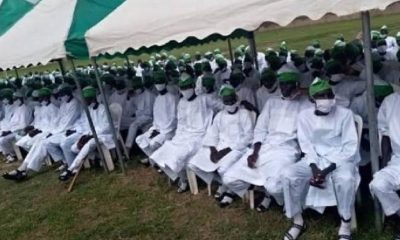News
Gadget prices start to fall as naira pares losses

The prices of gadgets have begun to fall on the back of the naira’s recent gains against the dollar and other major currencies, according to a market survey by BusinessDay.
Nigeria’s currency has rallied in recent weeks after falling to record lows in January and February. It closed at N1,255.07/$ on Thursday at the Nigerian Autonomous Foreign Exchange Market, according to the FMDQ Securities Exchange.
The naira appreciation has started reflecting in the prices of gadgets, which became more expensive when the naira’s fall peaked at over 1,800/$. According to several vendors at Computer Village in Ikeja, Lagos, the prices of devices and gadgets have slowly begun to fall in the past one to two weeks.
“An Acer laptop that was N450,000 in January now costs N325,000,” Precious Osy-Ijomah, a vendor at Computer Village, said.
Another vendor who requested anonymity said that a Zealot speaker that was N80,000 in January now costs N55,000.
“We used to sell a tablet for about N118,000. It costs N95,000 now. In January, prices were so unstable that the price we sold gadgets in the morning would be different from the price we would sell that same gadget in the afternoon just because the dollar rate had risen,” said another vendor who identified herself only as Somto.
When asked how he knew when to change the prices, he said their wholesalers always informed them of new prices on the spot.
However, some other vendors said that although the naira has gained in recent weeks, there will be no major price reduction until the current inventories have been sold.
“There will not be any drastic reduction in prices till September because we need to sell off the stock we bought at the high rate,” a vendor said, adding that other factors may keep prices up.
“Other factors like import duty and electricity fees will also impact prices. Electricity for N1,000, which used to be 11 units, is now four units for the same price,” he said.
Confidence Sorochi, another vendor, lamented that sales have been poor for her in recent times.
“I usually sold five to six laptops a day, but now I struggle to sell one. Although the dollar rate is reducing, marketers need to be told to reduce their prices. No matter the dollar rate, they fix the prices,” she said.
Read also: Naira now exchanges at 1,245 as BDCs await CBN to adjust rate
She added that many of the gadgets that will flood the market soon were bought at high naira rates, and this would limit the decline in prices.
“Product prices in January affected our ability to purchase, which in turn affected sales for us. We have had to pump in more capital, which has reduced our stock. Instead of 10, we now buy 5. However, when the dollar started coming down, prices didn’t rise anymore. Now, we can predict what we will meet at the market,” another vendor said.
According to the Nigerian Communications Commission, about 63 million gadgets are sold annually in Nigeria. Over 132 million unique devices were on the country’s telecommunication network in 2020, underscoring its vast digital needs.
The growth in the demand for gadgets has been attributed to the increase in the number of telecom subscribers in the country. As of January 2024, 218.11 million mobile subscriptions were on the country’s network.
News
Infrastructure: Kalu Builds New Classrooms, Roads, Boreholes In Bende Communities+PHOTOS

By Gloria Ikibah
Communities in Bende Federal Constituency, Abia State, are beginning to see visible signs of change as Deputy Speaker of the House of Representatives, Rep. Benjamin Kalu recently launched a series of public infrastructure projects.
The initiative, which began on Friday, took Kalu across three key wards Bende, Itumbauzo, and Uzuakoli, where he formally opened a number of completed facilities. These include blocks of classrooms, administrative offices, rehabilitated roads, and new boreholes.

Bende Constituency, one of the largest in the country with 13 wards, has long grappled with infrastructure gaps. The newly delivered projects are seen as part of a broader effort to close those gaps and raise the standard of living in the area.
Residents say the projects are already making a difference in both school attendance and ease of movement between villages. Many hope this momentum continues in the months ahead.


News
Deputy Speaker Leads Defection of PDP Stalwart Chris Igwe, 13,000 Followers to APC In Abia

News
Speaker Abbas Raises Alarm on Workplace Safety in Nigeria

…as labour minister call for stricter laws to protect workers
By Gloria Ikibah
Speaker of the House of Representatives, Rep. Abbas Tajudeen, has expressed serious concern over the state of workplace safety in Nigeria, calling for urgent legislative action to prevent further injuries and fatalities.
Speaker Abbas made the call during the 2025 World Day for Safety Conference, with the theme: “The Legislative Perspective: Safety First – Building a Safer Future for All Nigerians”, organised by the House Committee on Safety Standards and Regulations at the National Assembly complex on Tuesday.
The Speaker who was represented by Ondo lawmaker, Rep. Oluwatimehin Adelegbe, said that the occasion was a reminder of the need to protect Nigerian workers from occupational hazards.
He said: “Today’s event is very significant, especially in the lives of workers across the globe. It reminds us of the need to guarantee the safety of workers against occupational hazards and fatalities.
“In societies where life is not given the right premium, workers are exposed to various accidents and dangers. Every worker has a right to be protected.”
Speaker Abbas acknowledged the global importance of the World Day for Safety, which was launched in 2003 by the International Labour Organization (ILO), and shared alarming statistics. “About 2.3 million workers lose their lives every year from workplace injuries and health hazards, with about 160 million non-fatal injuries,” he noted.
Abbas lamented the lack of reliable data In Nigeria, and said the most recent figures—238 deaths and 3,461 injuries in the construction industry—date back to between 2014 and 2016. “Even those reports are incomplete,” he added.
He also cited a study at the Federal Medical Centre in Asaba, which found that 52.7 percent of health workers surveyed had experienced needle pricks, while 53.3 percent reported incidents of blood splashes, and linked this to greater risks during outbreaks like Ebola and COVID-19, recalling the sacrifices of Dr. Ameyo Adadevoh and Nurse Justina Ejelonu, who died after coming in contact with the index Ebola case in 2014.
The Speaker blamed many of the injuries in construction sites and criticised the neglect of safety in public buildings.
“Unsafe acts and unsafe working conditions, including lack of personal protective equipment (PPE), hoisting gear, appropriate scaffolds and ladder protection.
“Most public buildings and workplaces in Nigeria are design-built and opened for use without safety checks. Apart from fire extinguishers, you hardly see buildings marked with reflective signs that guide workers in emergencies”, he lamented.
Abbas promised that the House would review and streamline existing laws to improve enforcement and public health protections.
“As the law-making body, the House of Representatives is poised to cause the necessary review of existing laws and seek ways to make them more effective in safeguarding public health and safety”, he added.
The Chairman Committee on Safety Standards and Regulations, Rep. David Idris Zacharias in his welcome address said the event marked a historic moment in our nation’s journey towards building a safer, more resilient society.
He stressed that safety must be prioritized, embedded in every policy, and included in every planning phase of our national projects. Whether it’s construction, road, workplace, environmental, or food safety, these are not peripheral issues—they are central to our well-being.
According to Zacharias, the committee’s mission is not only to pass laws but to ensure they are implemented effectively.
He acknowledged that enforcement gaps, poor awareness, and weak appreciation of safety still plague the country. However, he added, and that these challenges present us with immense opportunities to innovate, collaborate, and learn from others.
The committee chairman therefore called for partnerships with businesses, labour unions, NGOs, and the public.
He promised stronger enforcement, increased funding, more monitoring, and public awareness campaigns.
“Safety must be everyone’s concern. From the smallest corner shop to the largest industrial complex, we all have a role to play. We envision a future where safety is embedded in every organisation’s culture, every construction project, and every government policy,” he said.
The Minister of Labour and Employment, Dr. Muhammadu Maigari Dingyadi, in his message called for stronger legislation and cooperation among stakeholders to build a safer work environment for all Nigerians.
He also emphasised that while innovation is necessary, it must not come at the cost of workers’ welfare.
He said: “The theme of today’s conference, The Legislative Perspective: Building a Safer Future for All Nigerians, highlights the critical role of legislation in helping to shape a resilient and future-ready occupational safety and health framework.
“Legislation is central to navigating the digital frontier responsibly; ensuring that innovation does not erode the foundational rights, dignity, and welfare of the Nigerian worker.
“The safety of our workers must be anchored on secure technologies, sound data protection, and inclusive policy frameworks that uphold international labour standards”.
Dr. Dingyadi also stressed the importance of collaboration through the tripartite model involving government, employers, and workers’ organizations, to ensure policies are both enforceable and inclusive.
He further acknowledged delays in reviewing labour laws but said progress had been made, and called for unity across all sectors to build a lasting culture of safety.
“Year 2024 marked significant progress with the publication of Nigeria’s revised OSH Country Profile and the Federal Executive Council’s approval of landmark OSH regulations such as the Construction Safety Regulations 2024”, he added.
The Minister also spoke about the Occupational Safety and Health (OSH) Bill, which he said was developed through wide consultations.
“The Ministry has led the development of the Occupational Safety and Health Bill, which has been crafted through our distinctive Tripartite Plus framework. We count on the continued partnership of all stakeholders to make this a reality.
“Together, let us rise to the challenge of building a resilient safety culture, underpinned by innovation, inclusivity, and a shared commitment to protecting the lives of all Nigerian workers”, Dingyadi stated.
-

 Opinion20 hours ago
Opinion20 hours agoTHOUGHTS ON CONSTITUENTS DEVELOPMENT IN OBIO-AKPOR
-

 News15 hours ago
News15 hours agoJust in: Popular Nigerian billionaire, E-Money nabbed by EFCC
-

 Metro24 hours ago
Metro24 hours agoWanted CBEX promoter surrenders to EFCC
-

 News16 hours ago
News16 hours agoKing Sunny Ade’s family opens up over his whereabouts after daughter’s alarm
-

 Politics12 hours ago
Politics12 hours agoJust in: Ex- Gov Okowa accepts betraying Southern Nigeria, laments running with Atiku
-

 News16 hours ago
News16 hours agoEx-DIG,Olofu debunks online newspaper report, says ” I retired from NPF meritously after 35yrs service
-

 News12 hours ago
News12 hours agoBoko Haram Kill Mourners, Kidnap Others In Borno
-

 News24 hours ago
News24 hours agoBorno govt reintegrates 300,000 former Boko Haram terrorists






